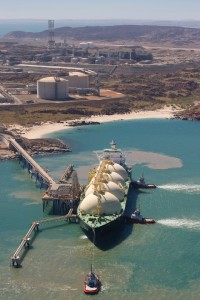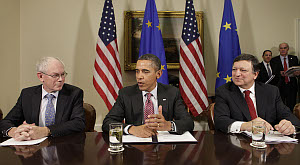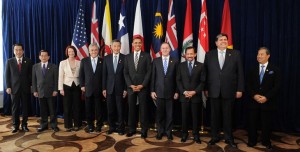
Is there a Strategic Case for Gas Exports: Yes, and it starts with Ambition on the Trade Agenda
Of Course the U.S. Should Boost Gas Exports – But We Should be More Ambitious: It is Time to Finish Free Trade Deals with Asia and Europe
 Licensing exports of natural gas would help America strategically – but this is not really about the gas, it is about American support for free trade. Since the end of World War II, the U.S. has been the world’s champion in creating a free, global trading system. The U.S. is a beneficiary of the global, open trading system and it is not in our interest to restrict trade.
Licensing exports of natural gas would help America strategically – but this is not really about the gas, it is about American support for free trade. Since the end of World War II, the U.S. has been the world’s champion in creating a free, global trading system. The U.S. is a beneficiary of the global, open trading system and it is not in our interest to restrict trade.
The debate in the U.S. has become solely focused on natural gas exports because the Obama Administration has been negligent about promptly approving gas export licenses and opaque about the process and requirements for approving the backlog of applications. This restriction should be lifted because it tarnishes the free-trade credentials of the United States.
However, this debate must be about more than just natural gas exports. Recent statements by some Members of Congress portray U.S. natural gas exports as a “weapon” against Russia, but this overstates the influence that U.S. energy can have on this crisis Ukraine.
Even if the U.S. government approved every export terminal application currently pending and if construction times and costs were reduced to zero, instantly giving the U.S. new Liquefied Natural Gas (LNG) export capacity, we would not see that much gas flowing to Europe because geopolitics also have to work with economics. Remember, this is not the U.S. government sending gas to Ukraine or the EU as economic aid: this is a private exchange between businesses. The demand for LNG is much higher in Asia, where prices are as much as double the price in Europe, we should not expect to see many tankers full of gas sailing to Europe any time soon.
The real “weapon” we should be talking about is not natural gas exports: it is the power of free and open markets. Free markets are always in the interest of the United States: they create an incentive for countries to invest in an open, global trading system instead of closed bilateral systems. They undermine the ability of petro-monopolies, whether Russia or OPEC, to extract geopolitical gains in exchange for goods. Free markets thrive on an open exchange of information that thwarts corrupt backroom deals.
 We saw how a bilateral trade deal between Russia and Ukraine was a spark to the ongoing crisis. For two decades, a succession of such deals saw the Ukrainian government give Russia geopolitical gains – like the right to base troops in Crimea – in exchange for cheap gas. The prospect of joining the EU in a trade deal instead of Russia was enough to bring protesters out into the street of Kiev – imagine if a deal offering more trade with the United States were offered.
We saw how a bilateral trade deal between Russia and Ukraine was a spark to the ongoing crisis. For two decades, a succession of such deals saw the Ukrainian government give Russia geopolitical gains – like the right to base troops in Crimea – in exchange for cheap gas. The prospect of joining the EU in a trade deal instead of Russia was enough to bring protesters out into the street of Kiev – imagine if a deal offering more trade with the United States were offered.
The most important thing we can do to help America’s diplomacy is to build an open trading system – with U.S. natural gas as a part of that system. The U.S. must re-engage with and complete both the Trans-Pacific Partnership (TPP) and the Transatlantic Trade and Investment Partnership (TTIP). Once a trade deal is formalized, U.S. law ensures that natural gas exports are deemed in the “national interest,” allowing access to U.S. gas exports to all parties in these deals.
Approving both the TTIP and the TPP will allow American businesses to export gas to most countries in Asia and Europe. More importantly, it will also give American companies the investment certainty to directly invest in countries in Asia and Europe that have their own unconventional gas resources. This is a real business op portunity for the American companies that have perfected the technologies needed for shale gas production here in the U.S. to go abroad and truly “globalize” the American shale gas revolution.
portunity for the American companies that have perfected the technologies needed for shale gas production here in the U.S. to go abroad and truly “globalize” the American shale gas revolution.
That means that Members of Congress should not waste time debating whether or not to approve LNG exports – they should immediately approve Trade Promotion Authority and start pressuring the Administration to complete negotiations on both the TPP and the TTIP. Once those deals are completed, the gas will start to flow – along with many other exports.
Great nations are not afraid of free trade – but Russia fears it because it will harm the oligarchs’ abilities to extort corrupt deals from subordinate nations. It is time for the U.S. to export natural gas. Even more importantly, it is also time for the U.S. to return to the business of free trade in goods and services of all types. In this time of change in global affairs, nothing would help America’s strategic position more than creating the two largest free-trade agreements in the world – the TTIP and TPP.






